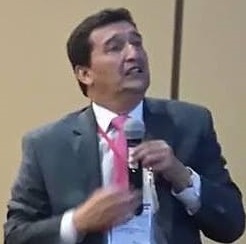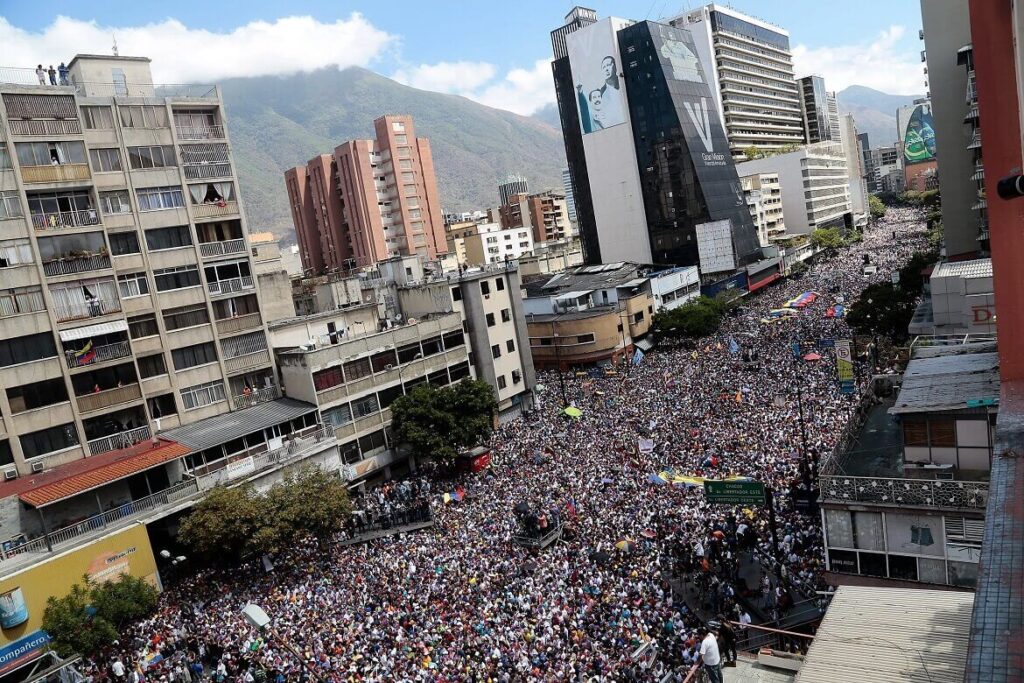By Mauricio Diagama Durán
Clausewitz’s famous phrase, a classic in the realist thinking of the geopolitical method, according to which “war is not simply a political act, but a true political instrument, a continuation of political relations, a management of them by other means” is increasingly real.

Only today, in a simplified version, as war is politics with other means, it seems to be understood and used the other way around by the world’s elected leaders, that is, as politics is only an extension of systematic violence, the use of excessive force and the violation of norms, in order to obtain immediate results and in function of particular interests.
The novelty of this vision is that many national leaders, supposedly democratic, are using force, violence or tools other than the constitution, the law or treaties as a priority and without many restrictions, without respecting or prioritizing the existing regulations, dialogue, treaties or institutional agreements, that is to say, politics. And, many opponents are using the same strategy. Thus, the citizens of the world, who expect solutions to their problems, are witnessing a political confrontation, in different latitudes, based on free elections and the preservation of democratic institutions, but led by leaders who act primarily using means other than the normative or dialogue, to achieve their purposes.
And as a complement to the above, these same leaders are using terms coming from liberal democracy, but adapted to their particular interests, as a basis for their actions, often shamelessly exceeding, in many occasions, the current norms to try to guide national and international societies. Concepts such as the people are above the institutions, justice is more important than the law, the mandate of elections authorizes any armed project, the interests of a nation are superior to those of humanity, and many more, are being used to justify all sorts of extra-legal actions.
In this line, the police authorities of Ecuador, guided by a democratically elected president, forcibly entered the Mexican embassy to capture a political leader opposed to the current government, violating all the rules of diplomacy and international law, which led to a rupture of relations between the two countries. The argument is that justice is above all and that the people demand that the corrupt be caught and tried wherever and however.
Ortega in Nicaragua, Bukele in El Salvador and Maduro in Venezuela, elected by the people, have been using democratic institutions for years to remain in power without any limits, persecuting their opponents and daily violating the same institutions that brought them to their positions. In addition, provoking daily the leaders of other countries with violent, disrespectful and hateful speeches, actions and responses. While Venezuela kidnaps Venezuelan opponents in other nations (Chile), who later turn up dead, the government of Nicaragua expels them, detains them or confiscates their assets, and at the same time demands respect for international law, boundary treaties and the autonomy of peoples when questioned. And in the name of internal security, the leaders of El Salvador, China and Cuba, among others, have prisons of terror, with thousands of untried prisoners.
Meanwhile, the democracies of Argentina and Colombia, question their good trade relations due to the nature of their leaders and their verbal violence, in addition to wanting to impose their internal reforms without dialogue or prior agreements, and the Venezuelan and Guyanese leaders are on the verge of an armed conflict over the dispute of a territory that seems to contain oil in its interior.
Thirdly, war and violence as a premise of power are used by the leadership of the main powers with greater frequency and under the protection of some supposed or real rights they have. While Putin, elected and re-elected in Russia, and Netanyahu, elected in Israel, use them daily, sacrificing thousands of lives outside their borders and in defense of their territorial interests and the resources they contain, the leaders of the peaceful Europe of the last decades (where modern liberal democracy was born and developed), are promoting an increase in European military capabilities, foreseeing an armed conflict with Russia (where opponents are eliminated without any problem). In this scenario, the acceptance of new European countries into NATO, moving the borders of that military organization to the east, also adds an element of war to the confrontation.
Moreover, Germany (which has already announced a reform of its military structures), together with France and England, led by democratically elected leaders, are providing Israel with weapons or support to continue an unbridled military operation towards Gaza. They even seem to have forgotten that they are directly responsible for the only two world wars in the history of mankind.
On the other hand, the case of the United States is worrying. In spite of the multiple wars it has promoted or developed throughout the world, no one is interested in questioning its leadership based on an unchecked military industry. The effect is also that the thousands of deaths caused, the direct interventions and coups d’état promoted by its governments are understood as its own right that authorizes it to act violently against those who do not respond to its interests. The case of the two atomic bombs dropped on Japan is emblematic in history.
Meanwhile, their great leaders block any resolution contrary to their objectives or those that harm their friends in the Security Council, they have a prison on the territory of the island of Cuba where the universal norms for the treatment of political prisoners do not apply and their military operations are assumed to be in defense of humanity. In other words, the U.S. leadership, which should be promoting diplomacy, economic cooperation and global development, has long since assumed the role of the world’s policeman.
And domestically, while some governors violate federal immigration laws, an incumbent president pretends to disregard elections that did not favor him and the massacres of armed civilians within his territory, derived from an archaic policy of carrying and selling weapons, seem to have no effect on his own leaders. So it is not surprising that Trump, with all his incendiary, disrespectful, aggressive, and out of the minimum standards of civilized coexistence, could end up being president again.
And the example leads to more violence.
While China’s leaders are constantly threatening Taiwan, those of India and Pakistan are doing the same to each other. The same is happening with Japan joining with the Philippines and the United States to defend the sea claimed by China, and the Russian leadership is putting the world on alert with its constant threats to invade the former countries of the Soviet Union. Not to mention the constant concerns caused by the North Korean leader, who became a latent danger for the whole region.
And today, in the Middle East, it is not known whether the attacks on a consular headquarters in Damascus will lead to a great war where Iran, Syria, Lebanon, Palestine and other countries, with leaders opposed to the existence of Israel, are ready to wipe out their own population, in the name of religious positions and the possession of the valuable historical and natural resources of the region.
Moreover, in Latin America the situation is no different. Several presidents, for years, have been encouraged with their proposals and behavior, contempt for the law, violence and the use of force, in international relations and even internally, to improve their audience or to achieve particular objectives. How can we forget Milei in Argentina, Bolsonaro in Brazil (trying to reach power again), Maduro in Venezuela or even a president of Colombia who ordered an attack on an area of a neighboring country where a guerrilla leader was located, without first having the permission of that state.
Thus, the excessive use of means based on violence or aggression, verbal or physical, is a critical issue among the world’s leaders, since many of their political opponents have also been using the same logic for a long time. It should be remembered that opposition or alternative groups to those in power decided some time ago to use force, some with violent terrorist actions and others located in states other than the powers that be are resorting to other forms of indiscriminate violence to try to force the fulfillment of their objectives, even within the borders of their own countries, affecting their own compatriots. How can we forget the Palestinians of Hamas, the extreme Chechens, the members of the Islamic State, the Colombian guerrillas and many others in different regions of Africa or the Middle East.
Fourthly, the rulers or leaders who are employing this line of thinking, no longer just come to power by force, but use elections to gain access to power and then employ various means to stay there. Hate-filled invitations for citizens to demonstrate, supported by governments or national leaders, in association with the persecution of those who do not support them, but using the structure of the state to do so, became common to give life to the idea of conserving power for the people. And in this scenario, ideological currents are not distinguished, since some are of the left and others of the right.
In conclusion, there are constant threats of war throughout the world, associated or at least encouraged by verbal violence or by the actions of leaders who present their interests as their own non-negotiable rights.
The problem is that, by putting force and violence as the first option, what is being said is that what is important are the objectives and not the means, that the results go beyond the instruments, that particular interests are above the collective ones and that the other actors do not matter as long as the goals of who has the power are achieved. In this scenario, attacking, assaulting, killing, lying, cheating, failing to comply or stealing is perfectly valid.
And naturally these ideas and actions have a direct effect on every citizen, company and country on earth, affecting global, national and local security, as well as human security. Here the simple principle that violence produces innumerable benefits and that it is true that the end justifies the means, harms, among other issues, the licit economies, as these are blurred in front of the illicit ones. And if the law, commitments, agreements or treaties are not complied with by the great leaders and countries of the world, then the door is wide open for other actors not to do so either.
Secondly, political dialogue is achieving very little in the face of this reality and the instruments available to society today are few and ineffective in trying to turn this situation around. Moreover, it seems that democratic institutions can be used cynically to attack others or to achieve the objectives of those in immediate power.
Finally, the positive vision in the solution of international or national conflicts, based on dialogue, diplomacy, debate, and by extension on the rules that emerge from them, seems to be being abandoned or imposed as the axis of civilized life.
And in the case of the international community the issue is more serious, since the conversations, assemblies, meetings and summits where agreements and treaties and resolutions are established do not seem to have much effect. This happens because there are no real commitments to comply with them and because if the states involved are not willing to submit to the calls for attention of the partners or if they are allies of those same powers, then the sanctions become innocuous.
Mauricio Diagama Durán – Business consultant and author of numerous writings on geopolitics, geoeconomics and international relations.
(The views expressed in this article belong only to the author and do not necessarily reflect the editorial policy or views of World Geostrategic Insights).
Image Credit: AP







